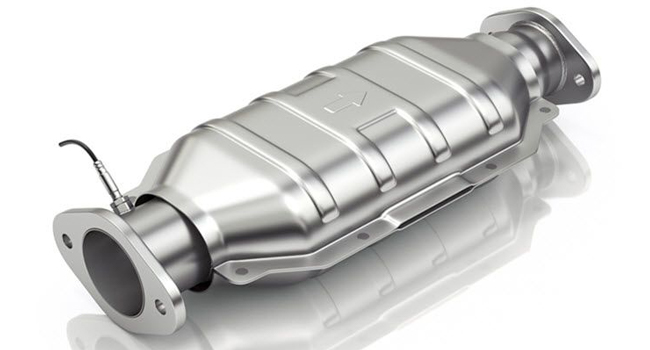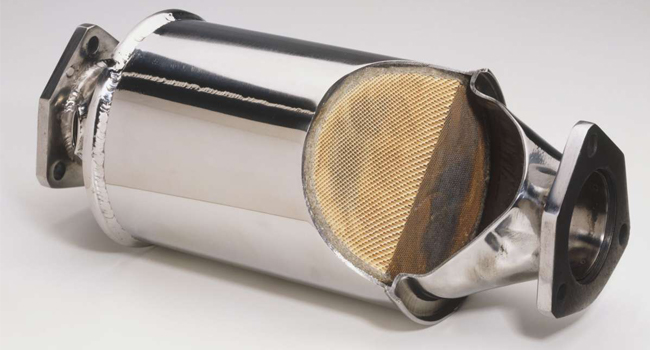Hot Topic: Catalytic Converters
And why are they such a hot topic? Pun intended. We take a look at catalytic converters and find out all you need to know.
So, what is a catalytic converter?
They are an emissions control device located within a car’s exhaust system. Catalytic converters reduce harmful emissions by ‘converting’ toxic gases into less-toxic gases.
Simply called ‘cats’ for short, catalytic converters are noticeable boxy bulges in exhaust pipes that ‘clean up’ the outcoming fumes. They deal with hot exhaust gas and operate between 150-600 °C but can record temperatures of up to 1000 °C.

To ‘clean’ exhaust fumes, a chemical reaction takes place. ‘Cats’ contain catalyst chemicals which speed up the process of breaking down the harmful exhaust gases coming from the engine.
The reaction removes or adds atoms which make up the molecules in the harmful gases.
Catalytic converters primarily fight nitrogen oxide by removing atoms and carbon monoxide by adding atoms, a process called oxidation.
All petrol and diesel vehicles have cats fitted as per regulations introduced in Australia in 1986.
 (a catalytic converter with a section cut out. source: sfgate.com)
(a catalytic converter with a section cut out. source: sfgate.com)
Leaded petrol, which is not sold in Australia, can’t be broken down into less-harmful gases by a catalytic converter, that’s a big reason why we use unleaded.
Carbon monoxide is not a friend
Note that although their names are similar, carbon monoxide is far more deadly than its dioxide cousin. Carbon monoxide attaches to the parts of blood that carry oxygen molecules and then blocks your body and organs from getting the oxygen it needs.
Known as the ‘silent killer’, carbon monoxide is a colorless, odorless, tasteless, and non-irritating gas which means the early signs of poisoning are difficult to detect.
Carbon dioxide, on the other hand, is less dangerous. Poisoning is rare but can happen in high concentration in confined spaces.
When you burn a candle, for example, you’re producing carbon dioxide. It’s a colorless and odorless gas that quickly dissipates throughout the atmosphere.
Cat burglars
“In other words, rhodium is around 560% MORE expensive than gold.”
You may have heard that criminals are targeting catalytic converters. It’s been a hot topic in the news for a while.
The thefts are increasing not just in Australia, but all around the world.
Why would a criminal crawl under a car to saw off part of the dirty exhaust?
Catalytic converters contain rare and expensive metals which are needed to perform the chemical reactions mentioned above.
These metals are typically palladium and rhodium - both are more expensive than gold.
Palladium - a rare silvery-white chemical element. It can convert as much as 90% of a car’s harmful gases into less harmful ones. It’s also used in electronics, fuel cells and hydrogen purification.
Most of the world's palladium comes from Russia and South Africa. Fortunately for us, some is also found in Australia.
Rhodium - an extremely rare chemical element. It is one of the rarest and most valuable precious metals out there. 80% of world rhodium production is used in catalytic converters.
South Africa produces over 85% of the global rhodium supply.
At the time of writing;
- Gold price per gram: A$79
- Palladium price per gram: A$105
- Rhodium price per gram: A$522
In other words, rhodium is around 560% MORE expensive than gold.
A battery-powered hacksaw can chop through an exhaust either side of a cat in minutes, sometimes seconds to release the prize.
The average cost to replace a catalytic converter is around $1,200 but can creep over $3,000, depending on the vehicle.
Who’s buying catalytic converters?
There are a number of places where thieves can sell catalytic converters.
Recycling centres: these places are responsible for extracting and recycling the precious metals. Fortunately, most catalytic converters have serial numbers on them and some metal recyclers are becoming more aware of criminals selling stolen goods.
Mechanics / wrecker yards: some catalytic converters can be sold for spare parts. As mentioned, replacing a cat can get expensive.
Online: sometimes these items are sold online too.
Cats at risk
If your catalytic converter is stolen, you’ll know. A car without a cat sounds extremely loud, especially when accelerating. Furthermore, most modern cars will trigger an engine warning light if the exhaust system is damaged.
Typically, vehicles with higher ground clearance are slightly more at risk, SUVs and utes for example. This is because thieves can get under the vehicle and operate tools with the added space between the ground and exhaust.
Hybrid vehicles are also a target as they push less exhaust fumes into the catalytic converter, resulting in a cleaner unit. Of course, EVs don't have cats so Tesla owners are safe.
Take care of your cat
There are a few simple things you can do to keep your car safe.
Park your car in a well-lit and frequented area. The noise made by sawing an exhaust system can be a deterrent itself so leaving your car where noises can be heard is a good idea.
CCTV and locked garages are naturally the safest options.
If you go shopping when it’s dark, try to park close to the shops or where people walk around. There have been reports of cats being stolen even in the few minutes the owners are in a supermarket.
